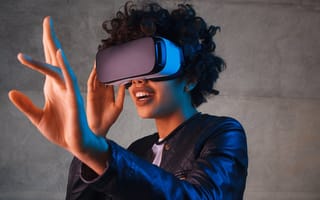
When IMAX shuttered its flagship virtual reality business in December, critics asked what was next for VR technology. Was it a harbinger of the technology’s eventual demise? Or was it nothing more than a minor stumble on the path of an industry expected to hit $33 billion in market size by 2022?
We interviewed five LA companies specializing in VR and AR technologies to figure it out. TL;DR: The VR industry is complicated, and not even an Oculus headset could help you anticipate what’s around the virtual corner.
Ashley Crowder is founder and CEO of VNTANA, an LA-based AR platform launched in 2012. The company, which allows users to interact with holograms without the use of a headset, was recently named among Inc.’s 5000 fastest-growing companies of 2018. After launching what the company calls the “first-ever” interactive VR shopping concierge (a holographic elf named Ellie) at the Mall of America in December 2018, VNTANA’s software is now rolling out to retailers nationwide.
How has the development of VR technology been different from others like it — 3D technology, for instance?
VR still has a lot of potential, particularly in training. Striker just released their study with Walmart that proved VR training is more effective and better received by employees. However, AR has a much larger potential because of its ability to project the digital in the real world, seamlessly connecting us to data like never before.
What major trends are you seeing in LA’s VR scene and what’s coming 2019?
In LA we’ve seen the launch of TwoBitCircus which is an amazing new-age arcade with fun VR games. Metastage also opened in LA this year, providing a state-of-the-art volumetric capture studio to create premium VR content.
VR storytelling continues to mature as well. After the first major VR acquisition at Sundance 2018 (CityLights bought the three-part VR series “Spheres”) I expect there will be a lot more VR pieces and acquisitions at film festivals in 2019.
Studies have shown that with AR and VR, users recall the experience as if it were a real memory.”
Are we thinking about VR the right way when we compare it to 3D and other entertainment advances?
VR has the ability to truly transport you to another place, giving users a feeling as if they were really there and experiencing what is happening around them. Studies have shown that with AR and VR, users recall the experience as if it were a real memory, which enables 40 to 60 percent higher retention rates. This has the potential to change every industry from education to healthcare, retail, entertainment and more.
Matthew Stoudt is the CEO of Applied VR, a virtual reality platform specifically for the healthcare industry. The company’s content offers VR experiences that help patients manage stress and pain. In 2017 at a healthtech conference hosted by Fortune, Arianna Huffington demoed one of the company’s stress training experiences onstage with Stoudt, stepping off a virtual cliff and free-falling over 500 feet. She was remarkably unruffled by the experience, which she referred to as feeling “incredibly real.”
How has the development of VR technology been different from others like it?
The technology went through a major hype cycle when Facebook placed a big bet on the industry. Gaming and entertainment jumped on the bandwagon based on hyped consumer penetration expectations. The challenge was that the value equation was under water. The “ost” of the technology (i.e. the friction of the technology, including price and form factor) far exceeded the benefit. In short, it lacked the killer app that would drive adoption. The value proposition for enterprise and place-based VR is much higher.
VR devices will help transform major industries — just look what HaloLens is doing with the Department of Defense.”
Are we thinking about VR the right way when we compare it to 3D and other entertainment advances?
Viewing VR through the lens of entertainment technology is part of the problem. I think of VR as more about enabling technology, like an iPhone or tablets. For example, the development of the iPhone opened up entire new business models and is helping to transform industries like healthcare.
VR devices will help transform major industries — just look what HaloLens is doing with the Department of Defense or what we are doing in healthcare. And as the manufacturers continue to reduce the friction, more and more killer app use cases will arise.
Talespin builds VR and AR enterprise tools to be used in training, daily work and business intelligence. The company classifies its offerings as ‘extended reality’ or XR technology, comprised of virtual, augmented and mixed reality approaches. Founded in 2015, Talespin now works with industry leaders including ADP, Workplace, MIT and the NFL. We interviewed CEO and co-founder Kyle Jackson, as well as Talespin’s director of people operations, Mélanie Vaget.
How has the development of VR technology been different from others like it?
While the entertainment and gaming industries were early adopters of immersive technology, we’re seeing businesses, in particular HR organizations, driving the exploration of VR/AR more and more. From a people operations perspective, VR and AR are compelling because they improve the way we work together, learn and collaborate, leveling up how we interact with the technology and tools we use every day in our jobs. – Mélanie Vaget, director of people operations
VR changes everything in terms of retention, and in turn has the power to transform learning and training.”
Are we thinking about VR the right way when we compare it to 3D and other entertainment advances?
3D was the evolution of a passive 2D viewing medium that required the viewer to wear glasses to get a minimal additional benefit. VR is a complete paradigm shift — viewing is no longer passive. Because of this inherent immersion and active participation, VR changes everything in terms of retention, and in turn has the power to transform learning and training. In that regard, VR is a much more engaging and promising medium than 3D. – Kyle Jackson, CEO
Are there any surprises about the industries that are investing in VR?
VR has the power to shift the design of our cities and the way we go to work, and ultimately impact every industry from real estate to healthcare. While many consumers primarily associate VR with gaming and entertainment, we’ve seen interest, and already built solutions, for clients in a wide variety of industries, including insurance, telecommunications and human resources. – Jackson
Jonah Hirsch is founder and CEO of CGO Studios, a virtual reality production studio based in LA. The company specializes in historical VR, including a project that takes viewers inside Anne Frank’s attic in 1942. The company has landed on top attraction lists at Comic Con and is working on a line of VR games, according to their website. Here’s what Hirsch told us about VR from a producer’s angle.
How has the development of VR technology been different from others like it?
While many early financial investors got burned in round one — hurt by the premise that anything in VR will work — the market has found a new round of strategic investors who are more focused on how the technology can help their specific area of business.
Similar to the early days of the internet boom where everything dot-com was thought to be a sure thing, the VR investment market is going through its own shakeout. I think the future will bring more disciplined investment from a wide variety of sectors looking to capitalize on strategic and long-term opportunities.
While LA continues to serve as home to a number of the best content creators, it’s still figuring out the best exhibition model.”
Are we thinking about VR the right way when we compare it to 3D and other entertainment advances?
VR is completely different than 3D technology. It’s going to create many new use cases across sectors including education, medical/research and automotive to name a few. Whereas 3D technology has mainly been limited to enhancing a movie-going experience, VR technology goes far beyond entertainment — its reach will continue to grow as the technology improves, unlike 3D, which has more or less hit its ceiling.
Eden Chen is a co-founder and managing partner at Fishermen Labs, an LA-based agency specializing in design and development for AR, VR and other and emerging technology products. Fishermen’s clients include Walmart, Sony, Regal, CBS and the United Nations, to name a few. (We too wonder what UN VR looks like.) The company, which launched in 2014 and is based in the Del Rey neighborhood just outside Playa Vista, ranked 185 on Inc.’s list of the 5,000 fastest growing private companies in America.
How has the development of VR technology been different from others like it?
When people think VR they automatically go to the consumer use case: gaming and entertainment. That’s because of properties like “Ready Player One.” The reality is that there are a lot of barriers to consumer adoption in VR that go well beyond just the technology not being ready.
VR has a very specific use case (full immersion), and many people frankly don’t like being in VR for prolonged periods of time. Compare VR to something like 3D printing, which started off in the manufacturing space, versus having massive consumer expectations that led partly to big infusions of capital and then the pullback we’re seeing today.
We’ve definitely seen a major decrease in the amount of VR work that we’ve done and what’s out there in 2018.”
What major trends are you seeing in LA’s VR scene and what’s coming 2019?
We’ve definitely seen a major decrease in the amount of VR work that we’ve done and what’s out there in 2018. We’ve seen a huge migration of that work over to AR as the more consumer-ready technology. The VR work that we are doing is focused on B2B applications: enterprise, manufacturing, healthcare and events. There are still some consumer opportunities out there, but it’s limited.
Are there any surprises about the industries that are investing in VR?
The biggest surprise for us was the amount of interest that healthcare has had in VR technologies. Healthcare often lags beyond some of the more consumer-focused industries, but they’ve seen a lot of effectiveness in trials, and areas like medical devices have such large price points that giving brands a premium way to differentiate their product makes sense.







